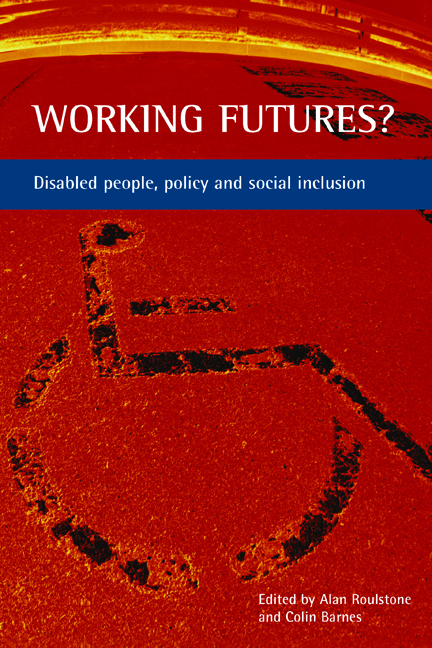Book contents
- Frontmatter
- Contents
- List of figures, tables and boxes
- Preface
- Acknowledgements
- List of abbreviations
- Notes on contributors
- Introduction Working futures: disabled people, employment policy and social inclusion
- Part One Work, welfare and social inclusion: challenges, concepts and questions
- Part Two The current policy environment
- Part Three Towards inclusive policy futures
- Index
- Also available from The Policy Press
eighteen - Disabled people and employment: the potential impact of European policy
Published online by Cambridge University Press: 18 January 2022
- Frontmatter
- Contents
- List of figures, tables and boxes
- Preface
- Acknowledgements
- List of abbreviations
- Notes on contributors
- Introduction Working futures: disabled people, employment policy and social inclusion
- Part One Work, welfare and social inclusion: challenges, concepts and questions
- Part Two The current policy environment
- Part Three Towards inclusive policy futures
- Index
- Also available from The Policy Press
Summary
Introduction
The European project, currently realised in the European Union (EU), has it foundations in the economic and inherently capitalist imperatives of the initial European Economic Community (EEC) established by the Treaty of Rome in 1957. The primary focus of the embryonic community was on facilitating economic integration, with wider social issues considered only insofar as they were deemed necessary to achieve the functioning of the common market. Thus, it is in this context that an employment-based disability policy emerged.
In the 50 years since its inception, the rationale of this project has evolved both in scope and scale to a state that would be almost unrecognisable to its founders. The EU could now be viewed as being primarily concerned with constructing what Castells (1998, p 333) describes as a ‘project identity’ whereby its democratic deficit and lack of popular mandate is addressed by the development of a “blueprint of social values and institutional goals that appeal to a majority of citizens without excluding anyone in principle”.
This chapter will discuss the shifting paradigms that have emerged in European debates about employment, social policy and disability during this most recent period of identity and consensus building. Furthermore, it will suggest that the aims and objectives of these often overlapping areas of policy are characterised by tensions between competing and perhaps increasingly divergent, drivers in this process of identity production. The replacement of the concept of citizen–worker (and the parasitic rights of dependent family members) with a more inclusive notion of citizenship based on nationality provides for the first time the opportunity for a comprehensive rights-based disability paradigm (Morgan, 2004; Morgan and Stalford, 2005). The aim here, therefore, will be to discuss the development of this paradigm and to offer pointers to its future development.
Background and context
Disabled people make up a significant percentage, about 10% (CEC, 2003), of the current EU population, a proportion likely to increase over time. However, the experience of disabled citizens of the EU has been characterised by an absence of their collective concerns and aspirations from agenda setting and decision making processes resulting in the marginalisation of issues relating to disability from the mainstream of EU policy and legislation.
- Type
- Chapter
- Information
- Working Futures?Disabled People, Policy and Social Inclusion, pp. 259 - 272Publisher: Bristol University PressPrint publication year: 2005



